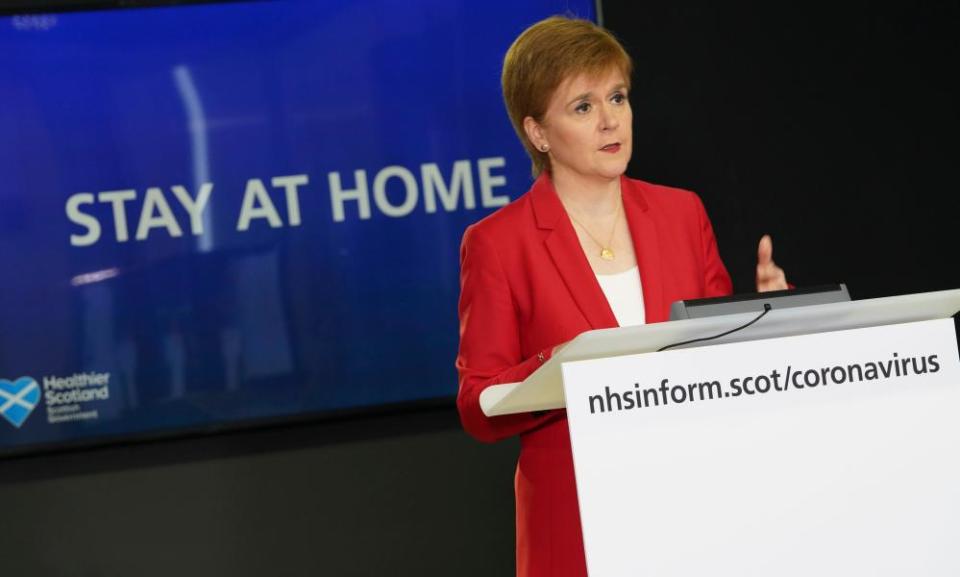Sturgeon reveals irritation over Whitehall lockdown messaging

Nicola Sturgeon made clear her irritation with Boris Johnson’s government on Sunday, after another chaotic few days of confused, ill-disciplined messaging about easing the lockdown from Whitehall.
With UK ministers struggling to explain its new slogan “stay alert”, which Sturgeon said she had seen first in the newspapers, she pressed home the point from the start of her daily briefing.
“Let me be very blunt”, she said. Mixed messages meant “people will die unnecessarily”. In an implicit rebuke for Johnson, she added: “Clarity of message is paramount if we are to rely on you to know exactly what it is we’re asking of you, and as leaders we have a duty to deliver that clarity to those we are accountable to, not to confuse it.”
Sturgeon disclosed that she had asked the UK government to restrict the use of the messaging to England, and to avoid allowing it to appear north of the border. She would lend its much stricter existing public health advertisement – the previously UK-wide slogan “stay at home, protect the NHS, save lives” – to the UK government for any advertising sites it had bought in Scotland.

As she spoke in Edinburgh, the Scottish government tweeted a fresh message: “Please continue to #StayAtHome. By staying at home, you are saving lives.”
That became another theme for the day, with the devolved government of Wales and Northern Ireland issuing distinctly different advice, in an effort to counter Downing Street’s sudden shift in messaging.
The Welsh government’s Twitter feed broadcast a 15-second clip with an unambiguous voiceover stating, “You must stay home.”
It too used the colour green but in a darker hue, with an animation of the virus spinning slowly. “We know it’s hard, but please continue to stay at home,” the tweet read.
Mark Drakeford, the Welsh first minister, was clear. “You should listen to the government of where you live,” he said on Sky’s Sophy Ridge on Sunday. Communications with the UK government, he said, was in “fits and starts”.
Arlene Foster, the Northern Irish first minister, was less direct, but confirmed that her power-sharing administration was also taking a different stance. It had reaffirmed the lockdown arrangements in full and would relax it only slowly, beginning this week.
She told Sky News: “I think it is important that we listen to our chief medical officer and chief scientific officer, we listen to the modelling. [It] is important that we do what is right in our region of the United Kingdom moving forward and that’s why we’re coming with our road plan early next week.”
While Foster’s tone was less blunt than Sturgeon’s, Stormont’s social media messaging was to the point. Northern Ireland’s health minister, Robin Swan, tweeted their own motif in yellow, blue and red, which said: “Keep staying at home; keep protecting the NHS; keep saving lives.”
On the surface, all three first ministers indicated that their differences with Downing Street were ones of messaging. All three insisted the prime minister was entitled to pursue policies that were right for England, and so too were they.
All three also said in their jurisdictions, the R number – the rate at which the virus multiplies in the community – was still too close to 1 to risk too quickly easing the lockdown. Foster said it was about 0.8 to 0.9 in Northern Ireland, close to that in Scotland.
All three said Johnson accepted, even embraced, the idea of the governments moving at the correct pace for their countries. They regretted, however, the fact that Johnson and his ministers had not matched that commitment with clear communication and collaborative policymaking.
But underlying that polite framing was a significant political message, which Sturgeon’s statement hinted at. She is determined to exude competence and discipline. Critics have accused Downing Street of lacking both.
The devolved governments have advantages Johnson does not have. They are smaller and have fewer duties and pressures than his. They also benefit from the UK government’s marshalling and investment in scientific expertise.
Messaging from Sturgeon’s government has had its flaws and failures: opposition MSPs have been charting the times her national clinical director, Jason Leitch, has given advice that was reversed within days. Also, on Sunday, her health secretary, Jeane Freeman, admitted that flawed official advice on transferring untested elderly hospital patients to care homes had been published on the Scottish government’s website.
But at the core of this weekend’s discord are contrasts in leadership. In her daily briefings, Sturgeon has consciously displayed authority and clarity in messaging.
Drakeford’s administration has been in lockstep about Wales’s lockdown stance. Sturgeon said she needed one thing from Johnson: a clear undertaking that whatever he said about the lockdown, he was only talking about one nation: England. Drakeford and Foster will agree.

 Yahoo News
Yahoo News 
